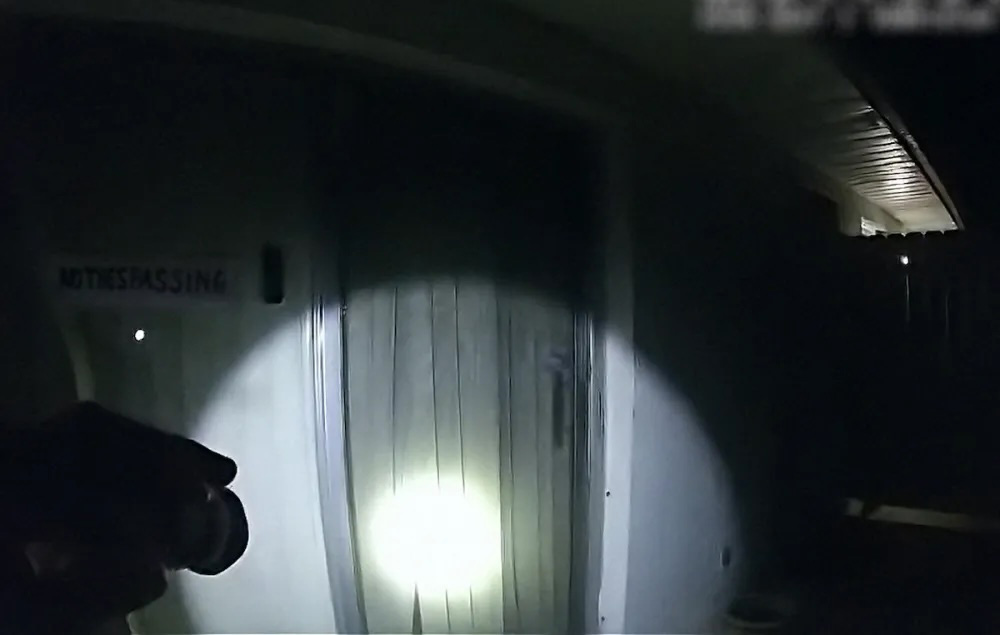There isn’t really a moment in the taut and staggering “The Perfect Neighbor” for the mind to wander elsewhere, but nonetheless the latest from director Geeta Gandbhir reminded me of “I Am Evidence,” the 2017 documentary she co-directed with Trish Adlesic in which the filmmakers gave a spotlight to the thousands of rape kits piling up in police stations across the country, unexamined after they were taken with survivors of sexual assault left in the dark about what was going on with them. The film itself became a public hearing of cases that would never find their way to court when they were never properly processed in the first place, a failure of both departmental priorities and bandwidth that became as horrific to observe as the crimes themselves. You wouldn’t necessarily know that “The Perfect Neighbor” was made by the same person — Gandbhir has never called attention to herself as a filmmaker by adhering to a specific style, and coming from the editing room, she’d probably find it best for no one to notice her work at all — but it takes time, skill and experience to make a film as powerful and seemingly effortless as what the filmmaker has here in charting a tragic series of events in a Florida community.
Told entirely with footage from cops in the Ocala Police Department, be it from inside their cars or on their body, “The Perfect Neighbor” chronicles the escalation of events that led to the tragic death of Ajike Owens, a 35-year-old Black single mother in June of 2023, sparking national outrage as local officials wavered on whether they could bring her killer Susan Lorincz, who could claim to have shot Owens with the protection of the state’s Stand Your Ground laws that indemnify property owners against trespassers. The format itself prevents much of that firestorm from being rehashed on screen as the film soberly reflects police visits to the street where Owens and Lorincz lived across from one another, with the latter prone to calling the cops on the kids that played in the neighborhood, including Owens’ and dared to get too close to her apartment. There’s never a question that Lorincz’s complaints are completely irrational, as cops grumble after leaving her apartment time and again about being unnecessarily hauled out and give the kids a warning, as much about their conduct as hers when they’ll confide they used to do the same things themselves growing up.
“The Perfect Neighbor” is unusual in its depiction of the police, who individually appear to be handling the situation as best they can with both patience and compassion, but are inevitably outflanked by the system of justice they serve when the law itself has become distorted beyond any original intention. Lorincz is within her rights to call the police as much as she wants without consequence though the kids’ behavior doesn’t warrant it and only more emboldened to take more aggressive measures when she doesn’t get results and with the film playing out in long, unbroken segments, the specific fixations and discrepancies that pop up in her testimony start to appear as a fantasy conjured not from the actual world around her but from a diseased media ecosystem bent on antagonizing marginalized communities. Gandbhir rarely has to provide much context for any of the footage and the racial dynamic at play emerges organically as the kids will start referring to the white Lorincz as a “Karen” (as do their increasingly aggravated parents) and police begin to ask Lorincz about her casual use of the “N-word.”
The deceptively raw presentation couldn’t have been easy to put together to such compelling effect and Gandbhir and editor Viridiana Lieberman’s meticulous choices of moments to hone in on and just how long to let them play can’t be overlooked, nor the soundscape created by Laura Heinzinger, credited with both the film’s score and sound design that quite subtly amps up the tension throughout. While a feeling of helplessness inevitably sets in as the situation with Lorincz comes to a head, “The Perfect Neighbor” turns its confrontational nature into an opportunity to engage as fear gives way to empathy for those so consumed by it in every corner. When the very worst has been realized, the opportunity to step back and reflect on what led up to it becomes most welcome rather than something to be resisted and although it vividly details a divide, it’s a film with the rare vision and power to bring people together.
“The Perfect Neighbor” was picked up for distribution by Netflix.




